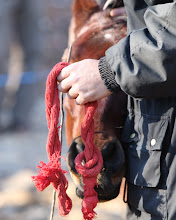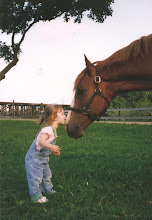This schooling, or understanding, is not affected through human dominance or submission of the horse. The goal is to inspire, to enkindle in a horse, to awaken its interest and to reveal its full natural potential. It is we who must adapt to the gentle, curious nature of the horse and not the horse that must be subjected to our selfish, demanding nature.

Alexander’s book, “The Horse Crucified and Risen” (Horse Encyclopaedia) opens to a reader secrets of education of a horse without any violence, without any bits and punishment. It is the firm belief that the book will raise the consciousness of many people and probably become the primary book for those who are looking for a particular, honest way of building communication with a horse. Recent offers resulting from the book fair in Frankfurt on October 6, 2006 will soon see the book published in English. Alexander makes a very clear distinction regarding any traditional training using all kinds of equipment and his way of being with a horse.”

All the systems of man and horse relationships exclude any kind of love. Especially love for the horse. If we look narrowly at what sportsmen, stunt men, old classical school representatives do with horses, we’ll see clearly that such relationships would be logical only if they had hatred at the heart of their actions … I lived in the atmosphere of cruelty, watching how stunt men treated horses, how sportsmen tortured them every day. All that those people do with horses is not related to the feeling and passion that originally led them to horses…”
An excerpt from the prologue reads: “I am absolutely sure this book should not be read or even opened by those who chose equestrian sport, horse racing or driving and so on as their profession or amusement. Sportsmen, jockeys, riders and those who are similar to them will find out nothing good from this encyclopaedia. On the contrary it would be better not to have such an audience amongst the book’s readers because of their rancour, obstinacy and remarkable aggression that they show when they are trying to defend their right to force and torture horses.”
At the 39th Worldfest – Houston Independent Film Festival, April 21-30, 2006, the film, “Horse Encyclopaedia” received the Special Jury Award in the documentary film category. The jury not only considered it as an extremely bright work of great talent, but also the most honest and revolutionary film in essence. It previously also won the award at the New York Film Festival. The film has already split the horse world of Russia between staunch supporters and furious opponents of Nevzorov. View a trailer of the film.
Having been through several wars, Alexander states that, ” … You can hate violence towards the horse only if you hate violence towards men. Some eight or ten years ago I said definitely to myself that I would never treat horses as I was taught to anymore. But I didn’t know how to treat them otherwise. So my great emotional necessity to be with them required big and serious knowledge. I started traveling everywhere and studying. I tried to find people who could teach me that other manner of treating horses.
“My wife Lydia played a huge role in all this process, understanding that it’s impossible to love horses correctly without a proper European education, without some thorough knowledge of hippology. She finished a college [degree] in England and now continues her education acquiring extremely valuable knowledge about horses.
However, the science has never attracted me in the same way. But it was the horse that interested me: a horse as a sentient, very intellectual, suffering and spiritual being that was so humiliated by humans. My horse with a simply terrible character helped me a lot in my searches. His extraordinary resistance to any violence, any metal in the mouth, any spurs and other rubbish that one day I had no other way than to release him, throw away that entire stuff and to trust him …”
Alexander studied with masters of the horse world, yet, regarding the physical control of the horse, he does the opposite of what has been ingrained in us over thousands of years. What eventually became tradition seems to perpetuate the endless horse problems that many people face today.
Through a simple philosophy, you can discover that the solution is not someplace across the country at a 2-day horse clinic, but right in front of you with your own horse. It seems that people need to stop looking elsewhere for answers and start finding them by simply looking at their horse and thinking.
His horse, Perst, was his greatest challenge. It was a catalyst for change …
“But that case gave me an example of how a horse can change when you stop torturing him. This caused a revolution in my mind. Lydia and this horse became my main teachers. My work with horses then turned to be a complete success.”
Alexander alternates between teaching and playing with the horse during a schooling session. What he found is that this keeps the horse vibrant, focused, and willing. The horse develops physically and mentally. The horse learns instead of merely reacting to a painful, physical stimulus, such as a bit, or spur, or whip. The horse is allowed to choose to be with you or not. The school’s motto is, “The horse is always right”. This can be very difficult for many people to accept, but therein lies the key. This newly gained attention, friendship, and trust from the horse keeps his spirit and character intact, while bringing out his best qualities.
“At that time I also believed that all this is the evidence of my extraordinary talent. I didn’t understand that it was not my talent that really mattered but my approach and the feeling that I was no longer hiding from horses.
From then on I forgot all my previous experience and acted in accordance not with the norms of sportsmen and stunt men but with the feeling I felt for horses.
And I felt love and endless respect. This was the greatest instrument of all.”
Lydia Nevzorova:
Lydia Nevzorova graduated St. Petersburg Gerzin University (Arts), graduated with honors from College of Equine Studies (Newmarket) and continued studies at Equine Science at Warwickshire College of Equine Study of Harper Adams University, in England. Graduated from the Russian National Open University (Management), she carries out scientific research under the guidance of Robert Cook, FRCVS, PhD, Professor of Surgery Emeritus of Tufts University, Massachusetts, Yury Tkatchenko, PhD, Professor of Human Medicine (bio-technology). She is the author of a great number of magazine articles and is a successful, published horse photographer and member of the International Horse Photographers Association – IHPA. She founded the Horse Revolution in Russia to inform and educate people about the everyday abuse and suffering that horses endure for the sake of sport or through common ignorance, and is also Chief Editor of Nevzorov Haute Ecole Magazine.
She schools horses by Nevzorov’s method, without bits, bridles, halters and any other artificial aids. She also created the website and online school, and international forum for anyone who has reached a point of understanding to go beyond the norm, or for those who already have an understanding and immediately reject standard horse training based on physically induced pain.
Lydia specializes in computer thermography and, according to her own statistics, 99 percent of horses have sore backs. ‘ … In general, we may say that saddles that cost $2000 and for $200 have quite the same effect. Horses would be sound if they had received due care and had been trained properly (before) riding. The most common causes of horses’ injuries (lameness, arrhythmia, sore back, injured shoulders, muscle atrophy, etc.) are incorrect (preparatory) work, hoof trimming and shoeing (damaging the hoof balance) and incorrect saddling … ‘ Read the interesting, informative article.
About The Author:
Michael Bevilacqua owns and manages a horse schooling facility in Quebec, Canada. He offers informative seminars and private clinics on horse behaviour and Nevzorov Haute Ecole Principles.
There have been individuals throughout history and in our own lifetime that recognize the true spirit of the horse. Yet, in the past, when horses were an absolute requirement for daily survival and advancement of mankind, force was preferred.
There has been an improvement regarding the lessening degree of physical violence, but when I look around me, despite the catch phrases of ‘partnership’, ‘bonding’, ‘relationship’, what I still see is an attitude toward the horse of … ‘do it – or else’. In many cases, the term ‘natural’ does not necessarily mean not coerced. Often, the horse still has no choice. With the establishment of a center north of St. Petersburg, Russia, for horse rehabilitation and training for horses, people have begun to learn the true essence of the physical and mental wellbeing of the horse.
After the diverse, usual search for answers, I did not jump on any popular training bandwagon. Alexander and Lydia chose me to represent them in North America according to my past experiences and progressive life with my horses. I give guidance to those willing to learn in their English online school and am moderator for the international forum. I give private clinics and lessons according to their philosophy and understanding. Seeing their drive and conviction which, literally, has caused a revolution in their own country, I chose to spread the word by making the film available in North America and through my website, and by providing information seminars. With all the different horse trainers out there, it is surprising that people are still looking for a better way. Or is it? Another reason is that this is not something that you have to buy into. They offered encouragement, support, and knowledge. I had previously felt quite alone on my path. The answers that many ore seeking are quite simple. There are no levels nor packages to reach for or buy over and over. The book is out, the film is out, and now, by popular demand, a new release is out, ‘Nevzorov Haute Ecole Principles’ which explains the general principles of a horse’s education: Collection, Discipline, Lungeing, Cordeo, Touching, Composure.
It is not exactly an ABC method. It shows what is possible. The true answers lie within yourself and your horse. If looking at someone else reinforces what you believe your own horse is capable of doing with you, then it is available. If you want to learn or simply have a wealth of information at your fingertips, then visit Nevzorov Haute Ecole.




























